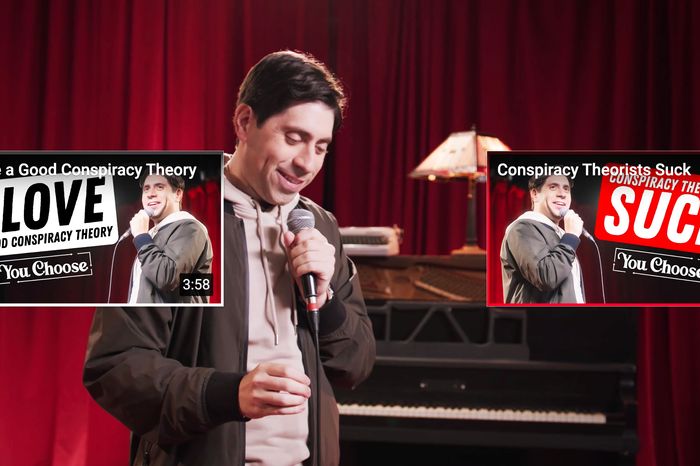
Fans of comedy and choice paralysis rejoice because a new stand-up comedy special catering to both experiences has arrived. On October 13, Danny Jolles released You Choose, an experimental choose-your-own-adventure-style special that furthers a miniature trend in comedy of comedians putting their audiences in the driver’s seat. As the name suggests, the special is interactive, formatted as a sequence of interconnected YouTube videos offering viewers two options after joke setups. As each clip rolls to a close, Jolles tees up the upcoming selections with leading phrases like “The thing about conspiracy theories is …” and two links appear onscreen, indicating opposing directions for each bit: In the case of the conspiracy-theories bit, the options are “Conspiracy theorists suck” and “I love a good conspiracy.” All told, Jolles tackles seven different topics from diverging angles in the special, and there are 128 different paths a viewer can take to watch it from start to finish. But the most illuminating way to watch it also happens to be the least adventurous: by doubling back after each selection to compare both versions of each bit side by side.
At first, the experience is disorienting. When watching Jolles, a comedian and actor who has performed on The Late Show With Stephen Colbert and appeared on Crazy Ex-Girlfriend, speak with equal conviction in support of and against the various subjects he dissects in the special (David Blaine, high school, veterinarians, etc.), the lack of clarity on his personal perspective feels like a critical flaw. But as the special progresses, the ambiguity becomes the point. The oft-touted ideal of “truth in comedy” is fraught, and the fact that Jolles is capable of offering two equally convincing yet incompatible perspectives over and over highlights how misguided it is to take anything he says (or, for that matter, anything any comedian says) at face value.
Jolles pulls it off because his comedic skill set lends itself well to argumentation. Across the special, he uses elastic facial expressions and contagious enthusiasm to build weighty stakes for each idea he raises. He weaponizes these talents equally well to explain why high school is far worse than any job you’ll have in adulthood (your co-workers “haven’t learned empathy yet”) and to argue that the trials of a high-schooler are trivial compared to those of an adult person in debt (“You ever been a grown adult and then another grown adult has called you on the phone and they’re just like, ‘You promised us that you would pay’?”). On multiple occasions, he peppers in the same details across opposing bits about a topic — an identical impersonation of Blaine, for example — to highlight how easy it is to reframe an audience’s perception of an idea with a slight alteration in his tone or delivery. While praising Blaine, the impersonation scans as celebratory; while criticizing him, it scans as mocking.
The downside of watching Jolles’s special this way is that it renders his closer, where he formally explains the special’s overarching ideas, too didactic. By the time he points out that the rhetorical power of comedy holds the potential to be abused — “Why would you trust me? Because I’m good on a microphone?” — the point feels belabored because he’s already demonstrated it seven times. But the performer who makes this seemingly sincere point isn’t a different one than has appeared onscreen at any other point in the special. He pulls from the same set of mannerisms and techniques to convey his grudge against his dog’s veterinarian as he does to urge viewers to be skeptical of the information they’re told at all times. Neither point needs to be true, so much as it just needs to feel true, and for the purposes of performing persuasive stand-up comedy, that’s more important.





